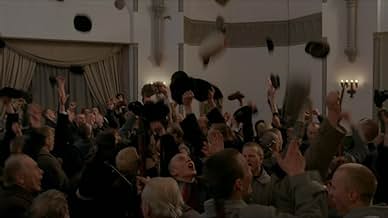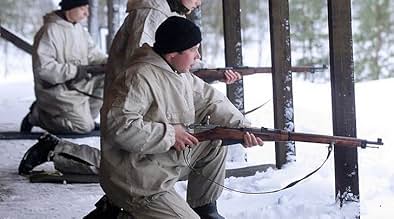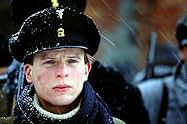Nimed marmortahvlil
- 2002
- 1 Std. 35 Min.
IMDb-BEWERTUNG
7,0/10
2399
IHRE BEWERTUNG
Füge eine Handlung in deiner Sprache hinzuThis movie is about the Estonian War of Independence (1918-1920), specifically the students fighting on the nationalist side, but also shown the conflict between two ideologies (Estonian nat... Alles lesenThis movie is about the Estonian War of Independence (1918-1920), specifically the students fighting on the nationalist side, but also shown the conflict between two ideologies (Estonian nationalism and communism).This movie is about the Estonian War of Independence (1918-1920), specifically the students fighting on the nationalist side, but also shown the conflict between two ideologies (Estonian nationalism and communism).
- Regie
- Drehbuch
- Hauptbesetzung
- Auszeichnungen
- 1 Nominierung insgesamt
Hele Kõrve
- Marta
- (as Hele Kõre)
Bert Raudsep
- Käämer
- (as Bert Raudsepp)
Empfohlene Bewertungen
The story is set in 1919, just after WWI has ended and the reds took over half of Europe. I wouldn't call them Russians, as you'll find out from the movie, that besides Russians there were Latvians and even Estonians in the red army. Unfortunately history repeats itself, in war it happens that brother fights against brother, or blood against blood.
It's a patriotic movie, of course. Estonians, as many other nations in the world fought for their freedom. What I liked in this movie is that it gave back very well the atmosphere of that time (excellent photography, and CGI perhaps) and also depicted very nicely the Estonian coutryside. Watching this movie I felt the urge to visit this country. Also liked very much that the film didn't want to make heroes. In contrary, it showed the weekness of these young students, the fear they felt being in war, killing other people. They were just victims of the war.
I bet this is one of the highest budgeted Estonian movies. But still very low budgeted comparing to American movies of the same category. So don't expect the same war scenes. However I liked it, as it is.
Only thing I can criticize in this movie is that the story is a bit too simple, too obvious. That's why I rated it 7/10. However it's an outstanding movie.
It's a patriotic movie, of course. Estonians, as many other nations in the world fought for their freedom. What I liked in this movie is that it gave back very well the atmosphere of that time (excellent photography, and CGI perhaps) and also depicted very nicely the Estonian coutryside. Watching this movie I felt the urge to visit this country. Also liked very much that the film didn't want to make heroes. In contrary, it showed the weekness of these young students, the fear they felt being in war, killing other people. They were just victims of the war.
I bet this is one of the highest budgeted Estonian movies. But still very low budgeted comparing to American movies of the same category. So don't expect the same war scenes. However I liked it, as it is.
Only thing I can criticize in this movie is that the story is a bit too simple, too obvious. That's why I rated it 7/10. However it's an outstanding movie.
The movie is nice, if you want to give it a credit just because it is one of the rare chances to see Estonian cinema. It is touching and somewhat sentimental, though the director managed to avoid too cheesy holliwoodish scene. The main plus is the touching feeling it evokes when you think about those young lads who got in the civil war and have to fight the outnumbering enemy. There is a love story, beautiful girl, but nothing really happens. There is a token brother-against-brother theme, that is supposed to show the brutal nature of the civil war. There are battle scenes, but the main battle scene against Latvians is too over dramatized and extremely unrealistic. In general, it's OK if you don't start thinking how in reality those battles would be possible. If you start thinking it seems extremely surrealistic and devoid of any resemblance of what the battle would be in the real war. Thus, some 10 young students lying in the half trench seem to stop the whole company of mighty Latvian Reds (those guys hugely contributed to the victory of REds in Russia). The movie ends abruptly, and you have a feeling that something is missing. As for historical part, it's interesting that most Estonian/Finnish spectators immediately see it as us (Estonians) fighting them (Evil Russians). The movie itself doesn't really show much Russians. Most Reds are actually Estonian. Another thing is that the Civil war in Estonia (and Finland) is often presented as Liberation war, while in fact it was a Civil war. Russians played a minor role in both countries. And it was a part of one giant civil war going on in the whole disintegrating Russian empire with Reds fighting Whites. So the words appearing in the beginning of the movie and saying that Soviet Russia wanted to establish itself as a European power (implying that Soviet Russia invaded Estonia) have more to do with current Estonian political situation than with the history.
This movie is totally for people who like foreign movies. And it really is the best movie, shot in Estonia (though Tarkovski's S.T.A.L.K.E.R. was also shot in Estonia) and by Estonians. I only disliked the ending, when the main character turned into a Rambo-like character. That was a shitty idea. A bigger budget would have given the movie something more, though it had a huge budget for an Estonian movie. Computer graphics was so good, that know one knows, there were any, actually they used CGI to hide things in city-scene, they copied some soldiers and they made other changes as well...
And those who don't know about the war in the movies, should know, that there were similar wars in almost every Eastern-Europe countries between 1917-1920, cause Russia was weakened and unstable because of the World War I, and freedom fighters had good chances due that.
7.5/10
And those who don't know about the war in the movies, should know, that there were similar wars in almost every Eastern-Europe countries between 1917-1920, cause Russia was weakened and unstable because of the World War I, and freedom fighters had good chances due that.
7.5/10
5Jan_
Ladies and gents, the most overrated Estonian movie of all times. Yes - it is at times warm and touching, it boasts splendid cinematography, it lacks the daft, aggressive jingoism painfully present in most patriotic flicks (read: American ones) and is not exaggerated like the aforementioned usually tend to be.
So "Names In Marble" is not a bad movie per se. Having said that, there are things that add up to a heavy reduction in its overall value.
I personally found it irritating how Elmo Nüganen had chosen to ignore Albert Kivikas' novel and write an insipid and even quite cheesy plot riddled with holes. Nüganen obviously failed to decide whether to make a pompous war epic or a minimal, realistic drama. So he chose both. I don't know what my fellow countrymen sought in the movie; I myself found the overdramatized battle scenes (rip-offs from Saving Private Ryan, mind you) to be painfully out of place. As well as the romantic sub-plot which didn't exist in the novel in the first place. But since action and/or romance are the things that mainly appeal to an average moviegoer, you'd simply _have_ to include both - and ruin excellent script material in the process. Quite sad.
The acting is OK, but just that. No, there is nothing tearjerking in this movie, sorry to say so. Yes, the subject matter is extremely personal to us Estonians, but I found the novel a thousand times more touching and thought-provoking than this "blockbuster". And if you think that this is the very defining moment in Estonian cinematography, think again.
Oh, well. Without further ado: if you're an Estonian or a non-Estonian pathologically fascinated with local culture, and haven't yet seen the movie - go and see it, although be warned: you haven't missed anything. Otherwise do this: look up Olli Saarela's "Rukajärven tie", a splendid recent addition to a fine series of Finnish war dramas ("Talvisota", "Tuntematon sotilas"). Because while "Names in Marble's" only significant value stems from its patriotic sting, "Rukajärven tie" is actually a cinematic achievement in the best sense of the term.
So "Names In Marble" is not a bad movie per se. Having said that, there are things that add up to a heavy reduction in its overall value.
I personally found it irritating how Elmo Nüganen had chosen to ignore Albert Kivikas' novel and write an insipid and even quite cheesy plot riddled with holes. Nüganen obviously failed to decide whether to make a pompous war epic or a minimal, realistic drama. So he chose both. I don't know what my fellow countrymen sought in the movie; I myself found the overdramatized battle scenes (rip-offs from Saving Private Ryan, mind you) to be painfully out of place. As well as the romantic sub-plot which didn't exist in the novel in the first place. But since action and/or romance are the things that mainly appeal to an average moviegoer, you'd simply _have_ to include both - and ruin excellent script material in the process. Quite sad.
The acting is OK, but just that. No, there is nothing tearjerking in this movie, sorry to say so. Yes, the subject matter is extremely personal to us Estonians, but I found the novel a thousand times more touching and thought-provoking than this "blockbuster". And if you think that this is the very defining moment in Estonian cinematography, think again.
Oh, well. Without further ado: if you're an Estonian or a non-Estonian pathologically fascinated with local culture, and haven't yet seen the movie - go and see it, although be warned: you haven't missed anything. Otherwise do this: look up Olli Saarela's "Rukajärven tie", a splendid recent addition to a fine series of Finnish war dramas ("Talvisota", "Tuntematon sotilas"). Because while "Names in Marble's" only significant value stems from its patriotic sting, "Rukajärven tie" is actually a cinematic achievement in the best sense of the term.
The record-making, dazzling and thrilling Estonian blockbuster `Names in Marble' has brought nearly 150,000 people all over the country out of their comfortable homes to see something that takes your breath away.
The story evolves around a group of young schoolboys who decide to alter the course of history once and for all - to fight against the Soviet army and for the freedom of the new Republic of Estonia.
`Names in Marble' opens a doorway to a new dimension of Estonian cinema. Directed by Elmo Nüganen who is famous for his interpretation of many classical plays in several theatres in Estonia, the movie has a unique sense of closeness and significance that is not common for other Estonian movies. Nüganen adds another flavour to the picture by hiring the well-known Russian cameraman Sergei Astakhov to record the key scenes and arrange the almost perfect cinematography of the movie.
Another astonishment that the moviegoers might experience is the great work of some young and promising Estonian actors. The sincerity and clarity of the leading role, played by Priit Võigemast represents the possibilities and potential of Estonian cinema in reaching an international level.
It is unfortunate that the best yet Estonian movie has absolutely has no chance of getting a nomination for the `Best foreign film' Academy award - it lacks a certain multi-cultural perspective.
In the end it brought tears to the eyes, it did matter and it made us sit in the theatre until all the credits were shown and lights came on, reminding us how important it is to be who we are.
The story evolves around a group of young schoolboys who decide to alter the course of history once and for all - to fight against the Soviet army and for the freedom of the new Republic of Estonia.
`Names in Marble' opens a doorway to a new dimension of Estonian cinema. Directed by Elmo Nüganen who is famous for his interpretation of many classical plays in several theatres in Estonia, the movie has a unique sense of closeness and significance that is not common for other Estonian movies. Nüganen adds another flavour to the picture by hiring the well-known Russian cameraman Sergei Astakhov to record the key scenes and arrange the almost perfect cinematography of the movie.
Another astonishment that the moviegoers might experience is the great work of some young and promising Estonian actors. The sincerity and clarity of the leading role, played by Priit Võigemast represents the possibilities and potential of Estonian cinema in reaching an international level.
It is unfortunate that the best yet Estonian movie has absolutely has no chance of getting a nomination for the `Best foreign film' Academy award - it lacks a certain multi-cultural perspective.
In the end it brought tears to the eyes, it did matter and it made us sit in the theatre until all the credits were shown and lights came on, reminding us how important it is to be who we are.
Wusstest du schon
- PatzerThere's a surfaced road in one scene, but in Tartu in 1918 there were no tarmac roads.
- VerbindungenFeatured in Welcome to Estonia (2002)
Top-Auswahl
Melde dich zum Bewerten an und greife auf die Watchlist für personalisierte Empfehlungen zu.
Details
- Erscheinungsdatum
- Herkunftsländer
- Offizielle Standorte
- Sprachen
- Auch bekannt als
- Names Engraved in Marble
- Drehorte
- Produktionsfirmen
- Weitere beteiligte Unternehmen bei IMDbPro anzeigen
Box Office
- Budget
- 24.000.000 EEK (geschätzt)
- Weltweiter Bruttoertrag
- 83.112 $
- Laufzeit1 Stunde 35 Minuten
- Farbe
- Sound-Mix
- Seitenverhältnis
- 1.85 : 1
Zu dieser Seite beitragen
Bearbeitung vorschlagen oder fehlenden Inhalt hinzufügen






















